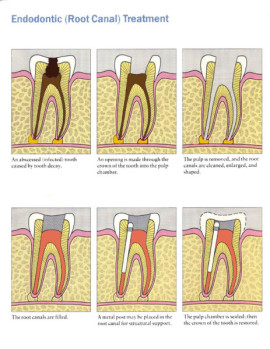Root Canal Therapy
Root canal therapy is offered as a treatment to help restore the healthy portion of the tooth, without resorting to extraction.
Many tooth problems involve infections that spread to the pulp, the inner chamber of the tooth containing blood vessels, nerves and other tissues. When the infection gets worse, it can begin affecting the roots. An injury to a tooth can also compromise the pulp, leading to similar problems.
Root canals are passageways that branch off from beneath the top of the tooth, working their way vertically downward until they reach the tip of the root.
A diseased inner tooth can pose a host of problems. Pain and sensitivity are just some of the first indications of a problem, while inside, the spreading infection can cause small pockets of pus to develop, leading to an abscess.
Root canal therapy is a remarkable treatment that has a very high rate of success. It involves removing the diseased tissue, to stop the spread of infection, and restoring the healthy portion of the tooth. Root canal therapy is designed to save a problem tooth; before this procedure was developed and gained acceptance, the only alternative for treating a diseased tooth was extraction.
Why is there a need for endodontic treatment?
Sometimes the pulp inside your tooth becomes inflamed or infected. This can be caused by deep decay, repeated dental procedures on the tooth, a crack or chip in the tooth, or a blow to the tooth.
What are the signs of needing endodontic treatment?
Signs to look for include pain, prolonged sensitivity to heat or cold, discoloration of the tooth, and swelling and tenderness in the nearby gums. But sometimes, there are no symptoms.
How can the tooth hurt if the nerve is gone?
Your tooth is still alive on the outside. The pain comes from infection and/or inflammation in the bone along the outside of the tooth. Medication will control this; time will heal it.
How much will the procedure cost?
The cost varies depending on how severe the problem is and which tooth is affected. Many dental insurance policies cover endodontic treatment. Generally, treatment and restoration of your natural tooth is the least expensive option. The only alternative is having the tooth extracted and replaced with a bridge, implant, or removable partial denture to restore chewing function and prevent adjacent teeth from shifting.
Will the tooth need any special care or additional treatment?
You should not chew or bite on the treated tooth until you have had it restored because your tooth could fracture. Otherwise, just practice good oral hygiene - brushing, flossing and regular checkups and cleanings. Endodontically treated teeth can last for many years, even a lifetime.
What should I do in the case of a dental emergency?
If you're experiencing a dental emergency, please contact our office right away at 206-783-7700. If it's after hours, our voice mail system will provide you with the proper instructions and the doctor on call will return your call as soon as possible.
Your smile is an investment for a lifetime!
The greatest compliment our patients can give is the referral of their friends and loved ones.
Refer a friend or family member to us and be sure they mention your name on their paperwork so that we can personally thank you. We'll also send you a $25 gift card to show our appreciation after their new patient exam, x-rays and cleaning.




